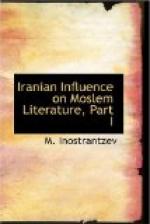The “Book of Adab” by Ibn al Muqaffa and other similar Arabic works 59
IRANIAN COMPONENTS OF ADAB LITERATURE IN ARABIC
At the head of works under the title of ethico didactic writings, which have come down to us stands a group most characteristically denominated Adab ul Arab val Furs belonging to the pen of a writer of the 10th and 11th centuries, Ibn Miskawaihi whose name is pronounced in Persian Ibn Mushkuya. At the basis of this collection lies the ancient Persian pseudepigraphical book Javidan khired, or “Eternal wisdom.” But in the body of it there is a series of literary monuments of Sasanian literature and its descendants.[1] The author is known, besides, by his philosophical works, as a historian[2] and as such he is particularly important for the history of the Buides.[3] And his Persian origin would point to his sympathy for Persian literary tradition. As a matter of fact, his ethico-didactic collection is based on a book of the Sasanian epoch. It would appear that this circumstance has undoubted significance for the determination of the influence in the compilation of Moslem ethical ideals. However, in contradiction to this basal fact and notwithstanding that in the province of the development of Islam as a religion, Persian element played an important part,[4] the development of the Moslem ethical tracts in contemporary literature, for the most part, is dependent upon more antique, specially Greek, tradition. J. Goldziher recognizing the importance of the influence of Parsism on Islam says the exact demonstration of the dependence of these phenomena on the culture historical facts, whose consequences they are, would be the most interesting task which those studying Islam in its present position can place before themselves. Many of the dominating views regarding the original spirit of Islam would receive the needed correction by such investigation.
[Footnote 1: On this work and its manuscripts see my Material from Arab sources 68-69.]
[Footnote 2: For Miskawaihi as a philosopher see Boer 116-119.]
[Footnote 3:—He was the treasurer and a close friend of the Buide Adudad-Daula.]
[Footnote 4: For a general sketch of Moslem ethics in ancient times see Carra de Vaux, Gazali, 129-142, and Encyclopaedia of Islam 4, 244-246.]
Let us examine three points regarding the influence on Moslem morals and general conduct. In the first place stand the moral writings of ecclesiastical character. The morality is rooted in and based on the moral of the Bible and then on the developed Moslem law and has absorbed in itself some of the elements of the ethics of Christianity. In the second place, there is a series of ethical documents of a most valued nature in the shape of proverbs, dicta, maxims, fables, constituting a kind of moral philosophy, often independent of each other, varied in their character, and different as to time and the




